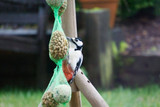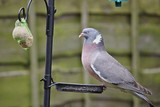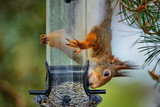What to feed birds in summer
Summer bird feeding tips
With temperatures on the rise and the evenings staying light till 10pm, summer can be the most rewarding season to have a delicious bird buffet in your garden. With these summer birdwatching tips from Kennedy Wild Bird Food, we will help you attract a varied flock to your back garden. But first, let’s debunk a common myth that often rears its head when feeding birds in the summer season.So, should you feed birds in the summer?
A common (but completely untrue) belief is that feeding birds in the summer will make them lazy and always on the lookout for handouts, instead of trying to seek natural food sources themselves. The truth is that bird feeders only supplement the diets of wild birds. They’re a great leg-up for birds, but they by no means provide their entire daily diet. This makes summer an ideal time to feed garden birds, and here’s why.Why is summer a great time to feed birds?
With nesting season in full swing, birds are raising their families, giving us keen bird watchers a prime view to witness the nestlings grow and learn to feed from our feeders.- Longer days mean more time to observe backyard birds and see a variety of different species.
- Birds are also in their plumage during the summer, making identifying them a whole lot easier, with brighter colours and clearer markings.

Bird feeding in summer - FAQs
Before we look at which foods birds should be eating, we wanted to get some of the more pressing questions out of the way.I know that birds need water in summer, but how much do they need?
There’s no right or wrong answer for this one. Just keep your water full at all times, and replenish regularly. 2-3 times a week, we’d say.When do I stop feeding birds in summer?
Again, it’s a difficult question to answer. You’ll know when you run out of summertime visitors. If your garden is nowhere near as popular with birds as it used to be (perhaps in late summer), then you will know that your summertime birds have moved on.Can birds eat porridge oats?
A quite common question, this one! Yes, birds can eat porridge oats. They must be uncooked, and it’s best if you soak them in some water beforehand.Best summer bird foods
Offering different types of bird food is the best way of attracting different birds, in any season. During summer, birds will also eat more fruits and insects in addition to the feed you leave out. Therefore, planting different types of plants will really optimise your garden. Some of the best summer bird foods include:Seeds
All types of seed are suitable for summer feeding, but sunflower hearts, in particular, are an incredibly popular option. Check out our guide to using sunflower hearts as bird food. Mixed bird seed will cater to a whole range of different birds, while niger seeds will help attract goldfinches and greenfinches. Read our niger seeds guide here.Mealworms
Insect-eating birds will definitely enjoy mealworms in your garden, especially as you are helping their hungry nestlings thrive with dozens of soft mealworms every day. Live mealworms are the best, but dried mealworms are great scattered among other bird seed mixes to provide that extra nutritional boost. Make sure you read our guide on using live mealworms for bird food.Peanuts
Whole peanuts or split peanuts are very popular with jays, tits, and woodpeckers. They can also be offered in special peanut feeders, too! When you spot nestlings feeding in your garden, make sure you offer split peanuts to avoid them choking. Using peanuts can be tricky, but very rewarding when you know how. Check out our peanut guide for more information.
...but beware!
While using a variety of food will attract plenty of birds, avoid using a soft suet product which may not stand the summer heat, causing it to melt, spoil, foster bacteria and grow mould. You can still use traditional suet for summer feeding though - suet pellets will help keep your birds full and satisfied all year long.Extra tips for summer feeding
To ensure you and your garden birds have the best feeding experience this summer, here are some extra tips:- Place feeders in a shaded area, to minimise spoiling seed and to encourage birds to visit more frequently and feed longer.
- Always supply a fresh water supply - this is not only hygienic for feeding birds, but it will also bring in species who do not always visit your feeder.
- Keep any cat(s) you may have indoors during feeding times, and take steps to discourage feral cats in your yard. This way, you will protect ground feeding birds and younger fledgelings from becoming prey.
- Provide birds with a fresh water source in the form of a bird bath. You’ll attract more birds wanting to drink as well as giving your feeding birds something to wash their food down with.
Inexpensive high-quality bird food in the UK
Feeding birds in the summer is a great idea, and with these tips you will find dozens of bird species enjoying your garden. Remember to log your sightings into our Birdspotter tool!25th Jun 2019
Explore Popular Articles
-
8 Easy Ways to Attract Woodpeckers to Your Garden
8th Apr 2024Woodpeckers are among the most interesting birds known for their drumming sound and bright colours.
-
How to Protect Your Bird Feeders from Pigeons ?
28th Mar 2024You must have noticed damaged feeding ports, hanging mechanisms, perches, lids and bottoms. Who coul
-
5 Foolproof Ways to Rat-Proof Your Bird Feeder
18th Mar 2024Building a bird-friendly environment is a delightful endeavour, but it involves the responsibility o




